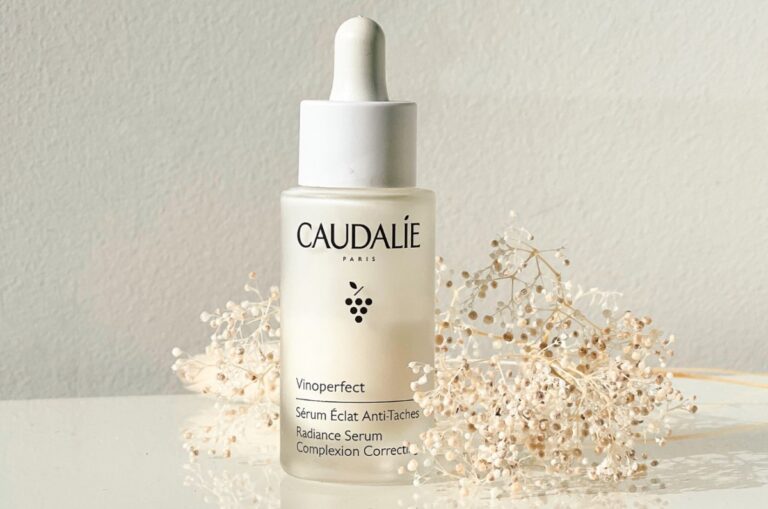Is Olive Oil a Seed Oil? Unraveling the Mystery
Of all the different kinds of oils, “seed oils” have drawn a lot of interest because of their health benefits and nutritional makeup. However, the categorization of oils can sometimes be confusing, particularly when it comes to widely-used oils like olive oil.
Is olive oil a seed oil? In this guide, we’ll delve into the composition, extraction process, and nutritional aspects of olive oil to determine where it truly belongs in the world of cooking oils. Whether you’re a health-conscious cook or just curious about what you’re adding to your dishes, this guide will clarify the distinctions and provide insight into olive oil’s unique properties.
What Is Olive Oil? Is Olive Oil a Seed Oil? The Basics You Need to Know
Olive oil is more than simply a cooking ingredient; it is a mainstay in many different cuisines across the globe. Extradited from the succulent fruit of the olive tree (Olea europaea), it’s a multipurpose liquid gold. For millennia, people have valued this Mediterranean jewel for its nutritional qualities and culinary uses.

1. Production Process
Ripe olives are collected in olive groves, which is where the journey of olive oil starts. After that, the fruits are processed either traditionally or modernly. To extract the oil, the olives are usually crushed, ground, and pressed. The type of olives used, when they are harvested, and the methods used during processing can all affect the oil’s quality.
2. Types of Olive Oil
- Extra Virgin Olive Oil: The highest quality olive oil, obtained through a cold-press process without any chemical treatments. It retains its natural flavor, aroma, and nutritional properties.
- Virgin Olive Oil: Similar to extra virgin, but with slightly lower acidity and a milder flavor. It may be produced using a combination of mechanical and chemical processes.
- Olive Oil: A blend of refined olive oil (made from chemically processed olives) and virgin olive oil. It has a neutral flavor and is often used for frying.
- Pomace Olive Oil: The lowest grade olive oil, extracted from the residue left after the initial pressing. It is typically refined and blended with other oils.
Is olive oil a seed oil? Spoiler alert: the answer might surprise you and change how you use it!
3. Culinary Uses
Olive oil is a versatile ingredient used in countless dishes. Here are some common culinary applications:
- Cooking: Drizzling over salads, sautéing vegetables, roasting meats, and baking.
- Flavoring: Adding depth and richness to sauces, marinades, and dressings.
- Preservation: Used to preserve foods like olives and vegetables.
- Beauty: Applied topically for skin and hair care.
Seed Oils Uncovered
Confused about ‘Is olive oil a seed oil?’ Dive into the details and discover why olive oil is a fruit oil hero. For millennia, seed oils have been an essential part of human diets, derived from the seeds of different plants. These oils are a great complement to a balanced diet because they are a rich source of vitamins, minerals, and important fatty acids.
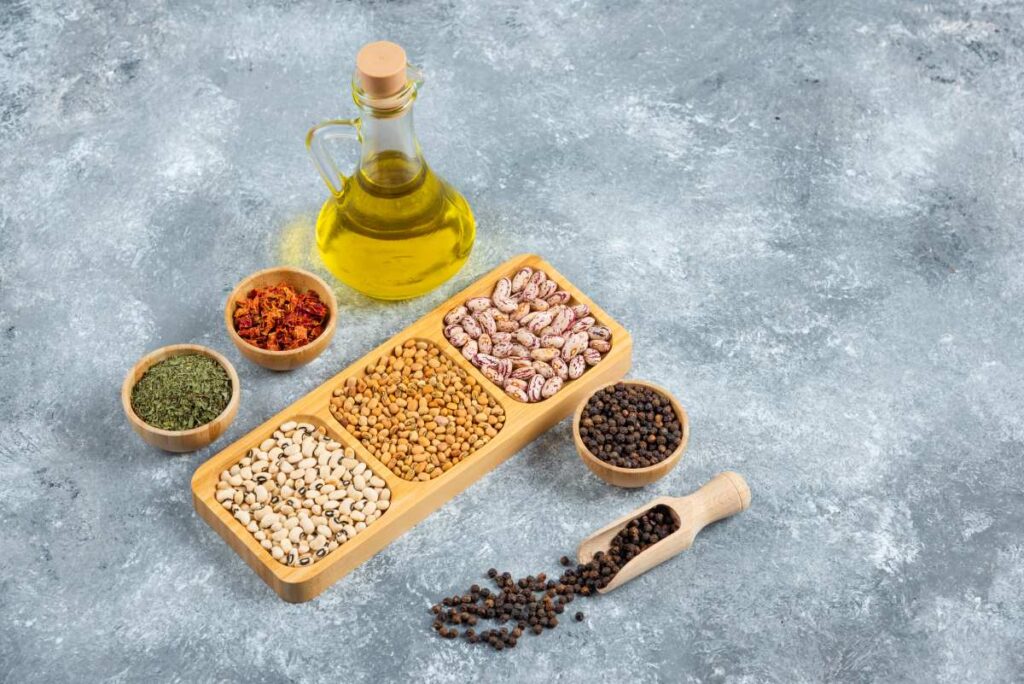
1. Types of Seed Oils
Seed oils come in an endless array of variations, each with its own distinct flavor, nutritional makeup, and culinary uses. Among the most prevalent kinds are:
Vegetable Oils
- Soybean oil
- Sunflower oil
- Canola oil
- Safflower oil
- Corn oil
- Grapeseed oil
Nut Oils
- Almond oil
- Hazelnut oil
- Walnut oil
- Pecan oil
Seed Oils
- Flaxseed oil
- Chia seed oil
- Pumpkin seed oil
- Hemp seed oil
- Sesame seed oil
- Poppy seed oil
2. Nutritional Benefits
Omega-3 and omega-6 fatty acids, among other important fatty acids, are present in good amounts in seed oils. These nutrients are essential for many body processes, including immune system function, heart health, and brain development. Furthermore, minerals like magnesium and zinc as well as vitamins like vitamin E, an antioxidant, may be present in seed oils. Find out if ‘Is olive oil a seed oil?’ and see why this oil deserves a prime spot in your pantry.
3. Culinary Uses
Explore the answer to ‘Is olive oil a seed oil?’ and learn why its exceptional properties make it a culinary treasure. There are many different culinary uses for seed oils. Typical applications include the following:
- Cooking: Frying, sautéing, baking, and roasting.
- Salad dressings: Adding flavor and richness to salads.
- Marinades: Tenderizing and flavoring meats and vegetables.
- Sauces: Enhancing the taste of sauces and dressings.
- Baking: Incorporating into baked goods for moisture and richness.
4. Health Considerations
Even while seed oils are typically beneficial, it’s crucial to use them sparingly. Consuming too much of some seed oils, especially those heavy in omega-6 fatty acids, might worsen inflammation and cause other health problems. In order to maintain the nutritional content of oils, it is imperative to select premium, unprocessed oils.
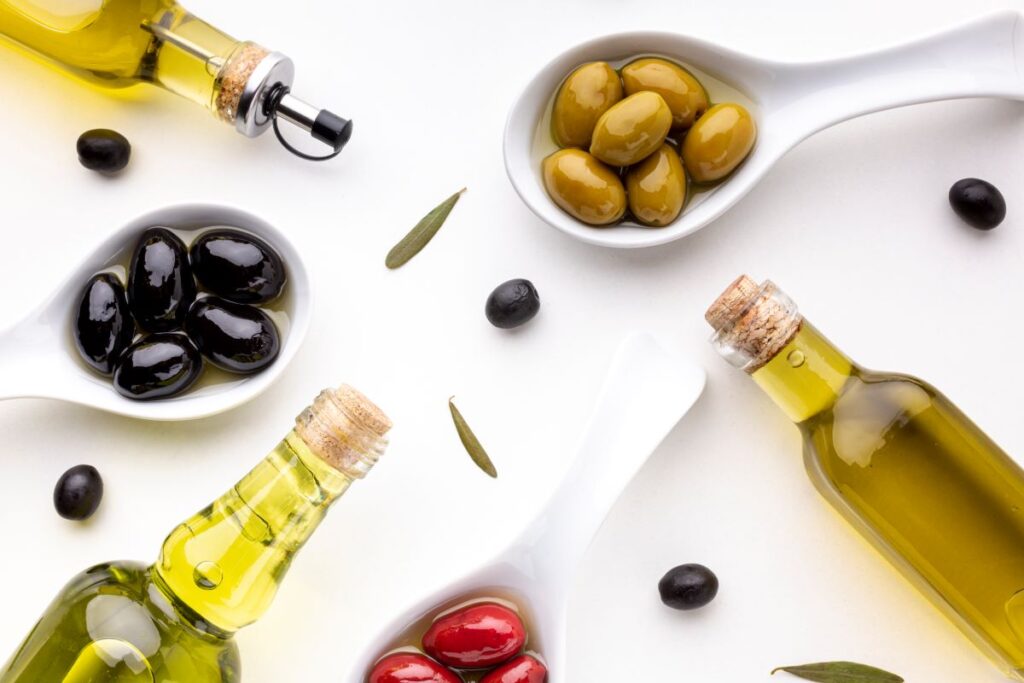
Seed Oils vs. Olive Oil: A Comparison
Although they come from plants, olive oil and seed oils have different properties that affect their nutritional value, composition, and uses in cooking.
1. Composition
- Seed Oils: These oils are often extracted from the seeds of various plants, such as sunflower, canola, corn, and soybean. They are usually rich in polyunsaturated fatty acids (PUFAs), like omega-3 and omega-6 fatty acids.
- Olive Oil: The majority of MUFAs, particularly oleic acid, are found in olive oil, which is derived from the soft fruit of the olive tree.
2. Nutritional Profile
- Seed Oils: Provide an adequate amount of vital vitamins, minerals, and fatty acids. They might have anti-inflammatory qualities and a high antioxidant content.
- Olive Oil: Is well known for having a high oleic acid content, which has been connected to a number of health advantages, such as heart health, decreased inflammation, and antioxidant protection.
3. Culinary Applications
- Seed Oils: Are adaptable oils that may be used for salad dressings, baking, sautéing, and frying. They are resistant to extreme heat and have a bland flavor.
- Olive Oil: Is frequently used for baking, roasting meats, sautéing vegetables, and drizzling over salads. Its unique flavor can make food taste better.
4. Health Considerations
- Seed Oils: Even though they are healthy, too much of some seed oils, particularly those heavy in omega-6 fatty acids, can cause inflammation. It’s critical to buy premium, unrefined oils and take them in moderation.
- Olive Oil: Is usually regarded as a healthy oil, but even so, it’s crucial to include it in a balanced diet and use it sparingly.
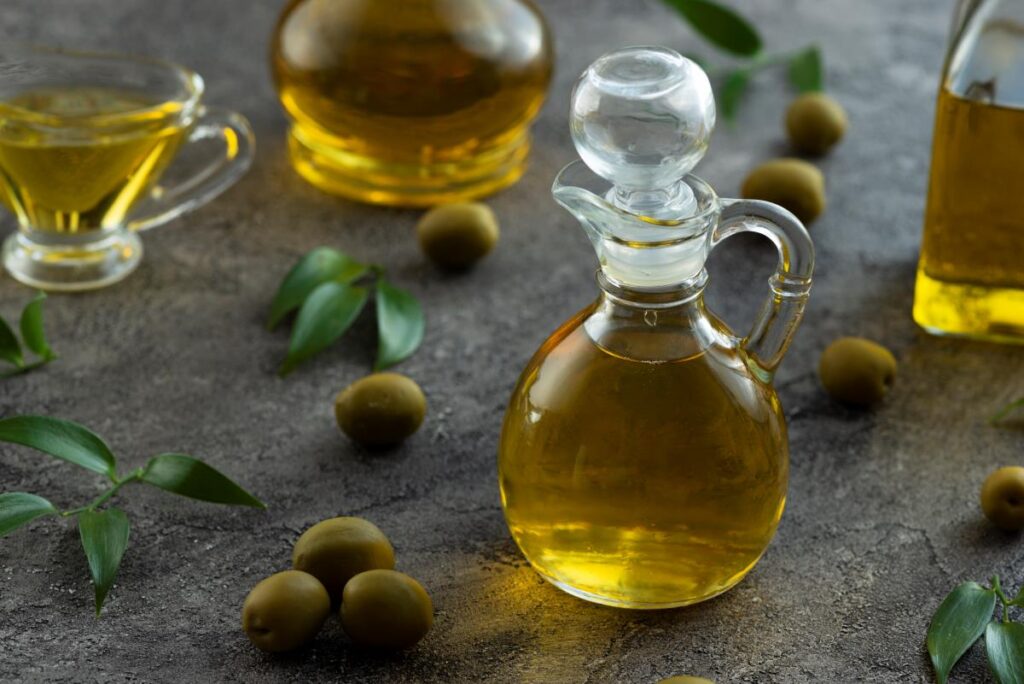
10 Ways to Use Olive Oil
Curious if ‘Is olive oil a seed oil?’ Find out why this versatile oil’s fruit-based composition makes it ideal for everything from gourmet cooking to luxurious skincare routines. An essential ingredient in Mediterranean cooking, olive oil can be added to food in a variety of ways to improve both its flavor and health properties. Here are a few well-liked methods for preparing meals with olive oil:
1. Drizzle Over Salads
- Add a splash of extra virgin olive oil to your favorite salads for a burst of flavor and a healthy dose of healthy fats.
- Combine with balsamic vinegar or lemon juice for a classic dressing.
2. Sauté Vegetables
- Heat a tablespoon of olive oil in a pan over medium heat.
- Sauté your favorite vegetables, such as onions, peppers, and garlic, until tender-crisp.
3. Roast Meats and Poultry
- Drizzle olive oil over meats and poultry before roasting to add moisture and flavor.
- Season with your favorite herbs and spices.
4. Bake Bread and Pastries
- Feel free to swap out butter or shortening for olive oil in your favorite baked goods recipes.
- To bread, cakes, and cookies, olive oil can impart a distinct flavor and wetness.
5. Make Marinades
- Marinate meats, poultry, and seafood in delectable marinades made with olive oil, herbs, and spices.
- Give your dish a minimum of 30 minutes or overnight marinating time in the fridge.
6. Drizzle Over Finished Dishes
- Finish your meals with a drizzle of extra virgin olive oil for a touch of elegance and flavor.
- This is especially delicious for pasta, soups, and grilled dishes.
7. Use in Dressings and Sauces
- Create homemade dressings and sauces using olive oil as a base.
- Combine with vinegar, lemon juice, mustard, or other ingredients to customize the flavor.
8. Cook with High Heat
- Refined olive oil can be utilized for higher heat applications, such as frying, but extra virgin olive oil works best for low-heat cooking.
- To prevent burning, pay attention to the oil’s smoke point.
9. Use for Skincare
- Olive oil can be used as a natural moisturizer in your skincare routine.
- Apply a small amount to your face and massage gently, or use it as a body lotion.
10. Use for Hair Care
- You may condition and nurture your hair with olive oil.
- Apply a tiny bit to your scalp and let it sit for half an hour before washing it off.
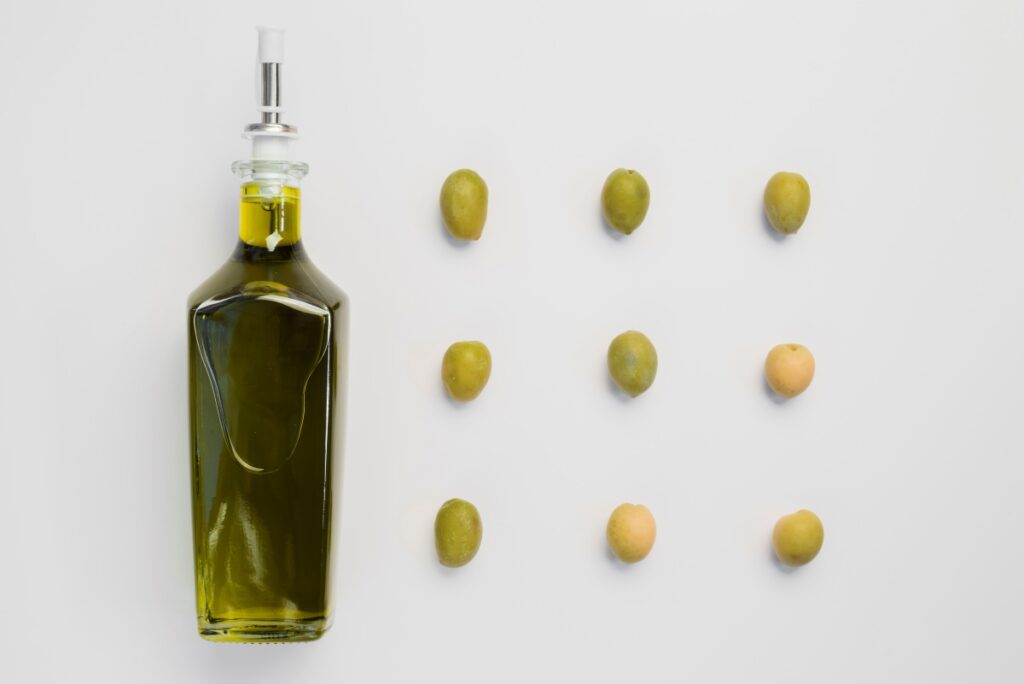
Explore the answer to ‘Is olive oil a seed oil?’ and learn why its exceptional properties make it a culinary treasure.
Taste and Health: The Olive Oil Advantage
1. Exploring the Flavor Profile of Olive Oil
✅ Extra Virgin Olive Oil (EVOO)
This premium quality olive oil is known for its intense, fruity flavor. It often exhibits a fresh, peppery, or grassy taste, with varying degrees of bitterness and a slight pungency. The richness of EVOO makes it ideal for use in its purest form—drizzled over salads, paired with bread, or as a finishing touch on dishes. The peppery aftertaste often found in high-quality EVOO is a sign of its potent antioxidant content.
✅ Virgin Olive Oil
Virgin olive oil has a greater acidity level and a somewhat milder flavor than extra virgin olive oil. Most of the fruity and nutty qualities are still present, though they are usually not as strong or overpowering. When cooking, this oil is frequently used because it has a milder olive flavor.
✅ Refined Olive Oil
Impurities are taken out of refined olive oil, giving it a more flavor-neutral texture. This makes it a superior choice for high-heat cooking methods where the flavor of the oil shouldn’t overpower the meal, such frying or baking. The higher smoke point and subtle flavor make it a versatile choice for various culinary uses.
✅ Infused Olive Oils
These oils are usually extra virgin olive oils that have been enhanced with additional flavors, such as herbs, garlic, chili peppers, or citrus zest. The base flavor of the olive oil complements these added ingredients, creating a unique taste that is perfect for adding a final flourish to your dishes.
2. The Health Advantages of Olive Oil
✅ Abundant in Monounsaturated Fats
Oleic acid, one of the monounsaturated fats present in high amounts in olive oil, has anti-inflammatory qualities and may promote genes linked to cancer. These healthy fats not only help lower dangerous LDL cholesterol levels, but they also maintain or even increase levels of good HDL cholesterol. For this reason, any diet intended to support cardiovascular health must include olive oil.
✅ Anti-Inflammatory Benefits
Olive oil has strong anti-inflammatory properties because of its high polyphenol and oleic acid content. Numerous disorders, including metabolic syndrome, diabetes, cancer, and heart disease, are significantly influenced by chronic inflammation. Regular use of olive oil improves general health by lowering inflammatory indicators in the body.
✅ Cardiovascular Health Support
The benefits of olive oil for heart health have been repeatedly demonstrated by research. It aids in lowering blood pressure, raising cholesterol, and preventing the oxidation of low-density lipoprotein (LDL), a critical stage in the development of heart disease. Individuals who adhere to high-olive-oil diets, such the Mediterranean diet, are at a lower risk of stroke and heart disease.
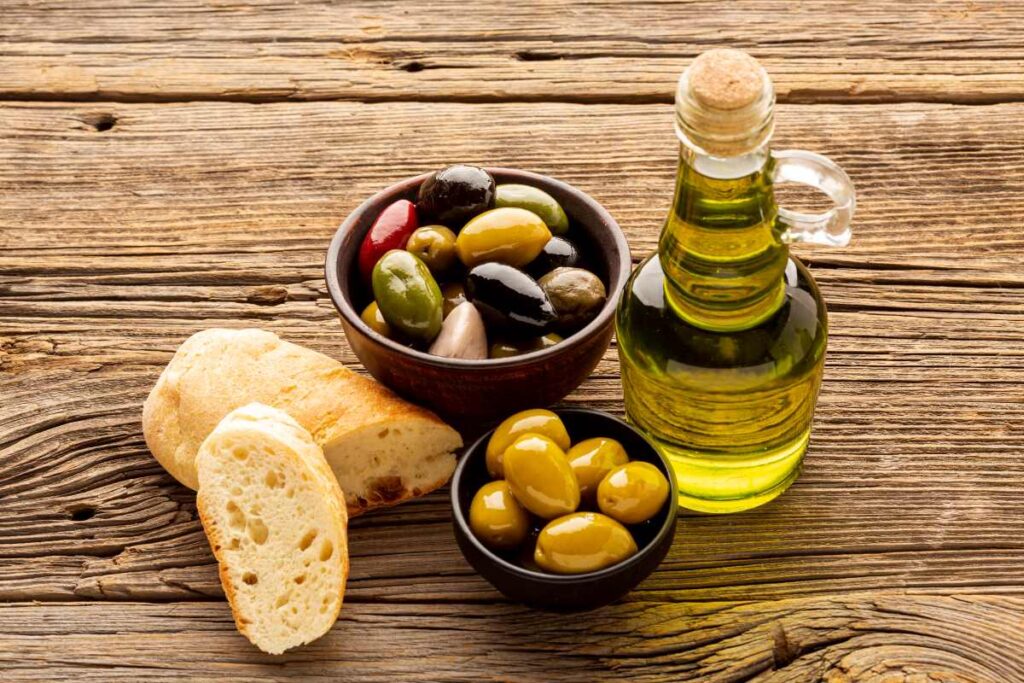
✅ Assists with Weight Management
Even though olive oil is calorie-dense, it can support weight management when included in a balanced diet. The healthy fats in olive oil promote satiety, which can lead to a decrease in overall calorie consumption. Moreover, its anti-inflammatory effects may support metabolic health and help prevent obesity-related inflammation.
✅ Potential Protection Against Type 2 Diabetes
Studies suggest that olive oil can improve insulin sensitivity and help regulate blood sugar levels, making it a valuable addition to a diet designed to manage or prevent type 2 diabetes. Incorporating olive oil into a balanced diet can help maintain healthy blood glucose levels and enhance insulin function.
✅ Promotes Brain Health
The healthy fats and antioxidants found in olive oil are also good for the brain. Frequent use of olive oil has been linked to a decreased risk of cognitive decline and may offer some protection against Alzheimer’s disease. Olive oil’s monounsaturated fats help to maintain the structure and function of brain cells, and its antioxidants lessen oxidative stress, which can damage brain tissue.
✅ Benefits for Skin and Hair
Olive oil is a popular ingredient in skincare and haircare due to its high vitamin E and antioxidant content. When applied to the skin, it can moisturize and protect, reduce signs of aging, and improve hair strength and shine. Its anti-inflammatory properties also make it effective in soothing irritated skin conditions such as eczema and psoriasis.
FAQ
Is Olive Oil a Seed Oil?
No, olive oil is not a seed oil. It is derived from the fruit of the olive tree, specifically from the flesh of the olives, unlike seed oils which are extracted from the seeds of various plants.
Why Is Olive Oil Not Classified as a Seed Oil?
Olive oil is not classified as a seed oil because it is extracted from the fruit (flesh) of the olive tree, whereas seed oils are specifically extracted from the seeds of plants.
How Does the Taste of Olive Oil Compare to Seed Oils?
Compared to the generally neutral taste of other seed oils, olive oil, especially extra virgin olive oil, has a rich, fruity, and occasionally peppery flavor that is more nuanced. Because of this, olive oil is the recommended option for recipes that want to showcase the flavor of the oil.
Are There Any Potential Drawbacks to Using Olive Oil on the Skin?
While olive oil is beneficial for many, it can be comedogenic (pore-clogging) for some individuals, especially those with oily or acne-prone skin. Additionally, its heavy consistency might feel too greasy for some users. Always choose high-quality extra virgin olive oil and monitor how your skin responds.
In Summary
To wrap it up, ‘Is olive oil a seed oil?’ is a question answered by its fruit-derived nature, underscoring why it remains a top pick for cooking and beauty routines alike. Once the qualities, flavor, and health advantages of olive oil are properly examined, it is evident that olive oil is not a seed oil. Olive oil is taken from the fruit of the olive tree, as opposed to seed oils, which come from the seeds of plants like sunflower, canola, or flax. This differentiation is important for the oil’s nutritional value and culinary applications in addition to the manufacturing processes.
Strong antioxidants, anti-inflammatory properties, and a high monounsaturated fat content make olive oil special. Because of these qualities, it is a cornerstone of the Mediterranean diet, promoting overall wellness, weight control, and heart health. It also gives depth and richness to a variety of dishes with its distinct flavor, which varies from fruity and grassy to peppery and nutty.
On the other hand, seed oils are often prepared differently and have a different composition, which might impact their stability and health advantages. They are also frequently richer in polyunsaturated fats. Although seed oils have a role in cooking, especially when used at high temperatures, olive oil has a unique combination of benefits that make it the better option for many culinary and health-related uses.
In conclusion, when asking “Is olive oil a seed oil?” the answer is a definitive no. Olive oil is a fruit oil with its own unique profile, setting it apart from seed oils and making it a valuable addition to a healthy diet.






